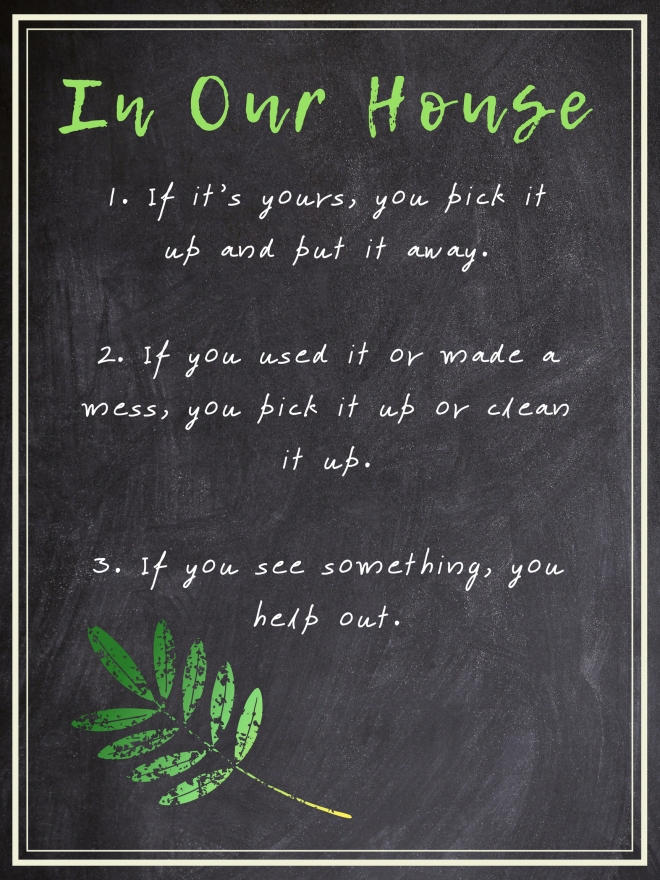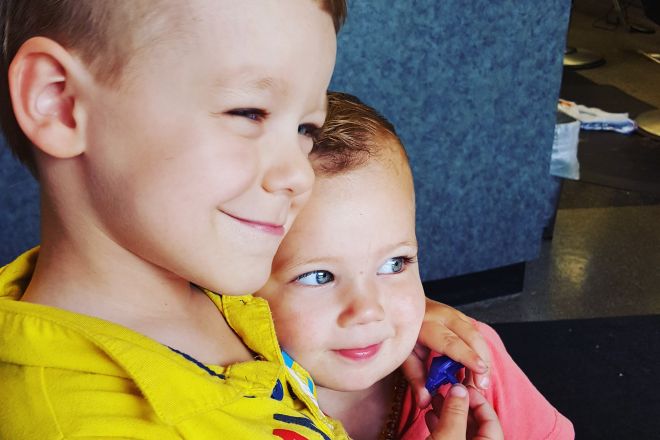As a feminist parent, I’ve thought a lot about gendered role models, what I’m teaching my boys about women, the effect of the current political climate on gender issues, and domestic labour issues. Recently, I had an interaction with my barely-four-year-old that smacked me in the face with the need to start re-framing the way we do domestic labour in our house – and it’s not, I was surprised to realize, through hammering in explicit ideas of equality.
I asked A a simple question: “Can you pick up your toothbrush?” It was on the floor of the bathroom.
He responded equally as simply: “Oh, no, Mommy – Daddy actually knocked that over. And you always say, ‘If you make the mess, you clean it up,’ right?”
I paused. I do always say that – when I want him to clean up a mess instead of expecting me or his dad to do it for him. I don’t want to raise no boys to men who don’t understand that they are responsible for their own actions!
At the same time, I realized instantly that I’m contributing to a very patriarchal ideology here: every-man-for-himself, avoidance-based individuality.
In this very small pause, I understood intuitively that if I really want to raise my boys to be equal partners with another human someday, I need to teach them not just equality, but community and nurturance. I need to teach them not just accountability, but helpfulness and generosity of spirit.
“You’re right,” I said. “I do say that. And now I think you’re old enough for me to explain to you that three different things are all true at the same time in our house,” and I explained to him the following rules, which my beloved and I have since talked about and agree that we want our kids to internalize as part of the fabric of our family:

So much of what I’ve seen of domestic labour organization and rules, both in my own life and in the stories I’ve heard from others over the years, comes from such a place of negativity or avoidance. We emphasize personal accountability for one’s own things in order to avoid someone else having more than ‘their share’ to do. We emphasize cleaning up a mess you made to reinforce warnings about undesirable behaviour and instill a sense that you are ultimately responsible for your own actions. We focus on division of tasks in an effort to make things ‘fair’, only to find that people become attuned to doing the bare minimum required. We use rewards and allowances with kids to inject some positivity into ‘chores,’ unintentionally perpetuating the dichotomy that work/helping = necessary evil, leisure/no responsibility = ideal end.
What bothers me most is that using these methods operates from an assumption that in our families and close communities, we will be taken advantage of, and we will be unfairly burdened with ‘someone else’s’ mess or consequences if labour is left unchecked; and that the ultimate goal of human life is to avoid effort and work – especially work we don’t deserve.
I’m trying to start from scratch. I’m hoping I can begin instead from a place where we’re all in it together, where we’ll all help whenever someone else is working on something, and where we understand that together, our efforts knit the beautiful fabric of our home and our life. If each member of our family follows all three rules, there will be less work and stress for all of us, and we’ll all feel supported.
If someone’s going to be a jerk about it, take advantage of others, or shirk responsibility, I’ll cross that bridge when I come to it, and my attention to that will, likely, be swift and relentless (I have zero patience for that shit!). But in the meantime, I’m going to assume the best, and try to teach my boys a way of life that I hope will serve us all well.
Since I’m new to this, anyone else have some strategies, framings, or words you use with your kiddos in this light? I’d love to hear them!
